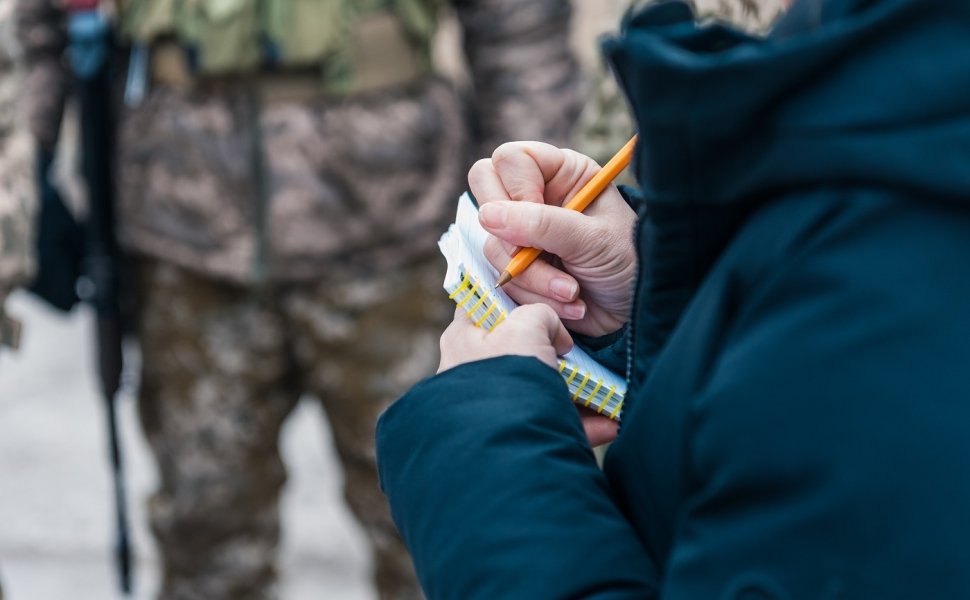
Since Russia launched its war against Ukraine in February, hundreds of journalists have left their country because they felt threatened by the Kremlin's crackdown on free speech. In the latest KennanX, Jill Dougherty presents the first in a two-part series profiling Russian journalists who have fled. She is joined by The Insider Founder Roman Dobrokhotov and Riddle Russia Co-Founder Anton Barbashin as they discuss how the war in Ukraine has affected their coverage, how to report investigative journalism in a country dominated by censorship and propaganda, and why they continue to stay connected to Russia despite it all.
Show notes:
- The SRB Podcast
- Teddy Goes to the USSR, a six-part podcast series
Further reading about and from Russian journalists in exile:
- Maxim Trudolyubov, Russia’s Journalism Is in Exile and Needs Support, The Russia File blog, March 17, 2022.
- Andrei Babitsky, ახალი ხორცი [Fresh Meat], The Russia File blog, March 31, 2022.
- Ekaterina Krongauz, Transit: Armenia, The Russia File blog, June 17, 2022.
Episode Transcript
-
KennanX Episode 21: Russia's New Expats
This transcript has been lightly edited for clarity.
Jill Dougherty: From the Kennan Institute in Washington, D.C., welcome to KennanX, a podcast on our never-ending quest to understand Russia, Ukraine, and the surrounding region. I’m your host, Jill Dougherty.
***
Roman Dobrokhotov: So they broke into my apartment in the middle of the night, they took all my computers, cell phones, and also documents and my passport, so they didn’t want me to leave the country. I think they understood that, if I am inside the country, under some investigation, it could be too dangerous for me to write something. But I still escaped from the country, through the forest.
Jill Dougherty: That’s Roman Dobrokhotov, the brash founder of the Russian online internet magazine, The Insider, that specializes in investigative journalism. His story sounds dramatic, but it’s not unique.
Since Russia launched its war against Ukraine, and even before – as Vladimir Putin turned the screws on independent media – hundreds of journalists have fled their country.
Many of them are living in the Baltic region – and that’s where I traveled in May: Estonia, Latvia, Lithuania. I was attending two security conferences – I’ll say more about that in a few minutes – but I really wanted to hear from these journalists who – many of them – felt threatened enough to gather their family together, pack their bag and take off – by plane, by car, sometimes on foot – not knowing whether they will ever be able to return home.
Over almost three weeks, I spoke with nine Russian journalists and one political activist who are now living in the Baltic countries. And over the next two episodes of KennanX you’ll hear their stories: how they view their work, now that they’re outside of Russia, and how they see Russia’s future in this time of war.
***
Roman Dobrokhotov: Well, officially we are registered in Riga but this is just an official registration because our journalists are working from Russia, Lithuania, Latvia, Poland, Germany, Austria, France, Portugal, Britain, America by the way, and in almost all European and Western countries we have at least one person and this is actually very good for our understanding of what’s going on.
Jill Dougherty: I spoke with Roman Dobrokhotov in Tallinn at the Lennart Meri security conference, which I’ve been attending for several years. He says most of the 25 staff of The Insider used to be in Russia. Now, most of them are outside of Russia. But The Insider’s problems didn’t begin just with Putin’s war against Ukraine, he says.
Roman Dobrokhotov: It started, actually, before the war. It started last spring, and now I understand that this war against journalism that Putin started a year ago – arresting journalists and labeling them foreign agents, or undesirable organizations, and when FSB were making searches in apartments of journalists – all of it was preparation for war in Ukraine.
At that moment we didn’t understand this but if you look at this in perspective you see that, actually, it is pretty logical that he brought some troops to [the] Ukrainian border a year ago, in the beginning of the year, and then suddenly he returned these troops back and now if you ask yourself why would he do this, why he didn’t start the war last spring, so for me the logical explanation is because of the political turmoil that was inside the country and because, when Alexey Navalny returned to Russia, there were very big protests and there were very big investigations of investigative journalists, including us. So we published investigations of the poisoning [of] Alexey Navalny and found all the – identified all the FSB agents involved in the poisoning. Also there were other investigations by our colleagues about Putin’s daughters, legal and unofficial daughters, and there was investigation by Navalny himself about Putin’s palace in Sochi.
So Putin understood that he has no resources both to control the situation inside and waging the war at the same time, so he returned the troops back and in several months we saw a very, very tough suppression of all the alternative voices inside the country including activists and journalists. There were hundreds of criminal cases against activists and most of them have to leave Russia. Those who didn’t leave are now in prison, I mean, those who work especially with Alexey Navalny.
Jill Dougherty: You know, Russia is still considered a pretty closed place and especially the subjects that you touch. Again, you’re talking about Putin’s daughters and things like that. Maybe even, you can give us some hints about Putin’s health! But … how do you do that? How do you possibly…
Roman Dobrokhotov: First of all, I remember that, like, about a year ago when I was still living in Russia, when I was visiting some countries including like America, people were so surprised that you could live inside the country and make journalism like this because people were absolutely sure that Russia is like North Korea, that there is nothing inside this, but no, it was still, last summer, it was a country full of journalists, including investigative journalists, who were brave enough to publish whatever they want, and I would even claim that Russian investigative journalism, last years, is still now and was the last years, the most effective and most prospering journalism all over the world, actually, including even America, because I know, of course, there are big corporations, like New York Times, Washington Post and others who provide sometimes brilliant investigations. But still, if you see the scale of investigations in Russia, with topics like – in what country and in what time would you have investigation also how your president tried to kill the main opposition with [a] chemical weapon and you discover all the people who stood behind it? It’s like super success. But to have such success you need to have such kind of regime. So, it’s like Newton’s law, the more strong they become, the more interesting our stories also become because we have some dictators and there are murders to write about. And also, because of this toxic environment, only those journalists survived in Russia who were effectively strong enough to get used to this new reality. So, yeah, I think this evolution brought us to the situation where we have a bunch of us – seven, eight – small investigative media that are very experienced and a new school of journalists.
Jill Dougherty: Dobrokhotov says he began as an “old school” journalist in 2005 … but now, there’s a new type of journalism.
Roman Dobrokhotov: A journalist, especially an investigative journalist, at that time was a person who just has a lot of sources, contacts, he also drinks a lot because how else you can get some information from your partners and friends, so usually they are very miserable people because their job was just to speaking, talking with people, go to different regions, because if you saw how this investigative journalist is presented in Hollywood movies, it’s usually, like, people who don’t comb their hair and (are) very poorly dressed and like they’re always drunk – yeah, miserable people.
This is not a real picture, of course, because they’re all very different but, still, there was a problem that big media corporations at that time thought that investigative journalism is declining. “It’s so expensive, we have to cut our budgets, we can’t afford a person who writes one article per month or even two months. People will click to other stories, they will click to gifs with kittens, not an investigative story about corruption.”
So that was the atmosphere at the time. And now we have totally new journalism. So now, investigative journalists are a bunch of young people with laptops who don’t have a lot of sources or no sources at all but who can use open sources of intelligence, who can understand how data bases work, who can navigate in black market of data – that is especially relevant for Russia, where we have all kind of data about each person. Everything you do is in some police database, and that’s why you can penetrate this database, and for ten bucks, buy everything about everyone, including FSB agents.
So, this appeared to be the best time to be [an] investigative journalist in Russia because lots of things coincided. First of all, we have very high demand on investigative journalism because the government is very closed and we don’t have a lot of information about what they are doing. Again, our government is committing such awful crimes like poisoning journalists and waging wars, stealing everything they see, etc., etc. So it is a lot of bright, interesting stories you can write about.
The third factor is that, again, we have enormous ocean of information that is both in open sources and in databases. In open sources it is because in [this] era, everyone has social networks, everyone uses cell phone, everyone – I don’t know – flies on a plane or buys tickets to a train in internet – so everyone has digital trace. I don’t know any person – even Putin has digital trace because he’s flying on special governmental planes and you can trace those planes where Putin is flying.
I like this job also because the first book I read was Sherlock Holmes, and I like the idea that a clever man with a pipe – I also smoke a pipe, by the way, because of Sherlock Holmes – a clever man with a pipe can, just sitting in his room, solve some crimes and some puzzles because he has some methods. He can analyze information and, because of this, understand who was the murderer. And what we are doing now is really a little bit the same because, actually, everybody has access to these tools, everybody can use them, but not everybody becomes an investigative journalist because it needs some skills of analyzing this.
So we have a lot of competitors in this market but I think we are, I mean The Insider and Bellingcat, are partners in the main investigations in Russia. We possibly just analyze these data a little bit better than others. And this is kind of like [an] intellectual game. So it’s both important for our country but it’s also very entertaining for ourselves. So I’m really enjoying this – analyzing itself – and of course, the stories are very interesting. I mean, you can’t watch HBO and Netflix series anymore. They are boring! Because you see, I’d better go to work because those stories are much more interesting and realistic.
Jill Dougherty: How is the war in Ukraine affecting your work now?
Roman Dobrokhotov: So, of course, the war in Ukraine is the most important topic for us. Our audience tripled - actually, the growth was ten times but our website was blocked after the war, so I think our audience is three times bigger than what it used to be before the war because people use VPNs [virtual private networks]. So the demand is very high, the demand for information in Russia is very, very high. People want to know about the war, people want to know about the future of Russian economy after sanctions. And people just want to understand just what’s going on. So, many of them were living just normal lives and many of them just didn’t want to have any interest in politics. Now they understand this is impossible anymore. This is, like, you need to understand what is this all about and we’re trying to explain this, not only doing investigations. We have opinion columns, we have experts who explain in simple words what’s going on. We have kind of explainers, including video explainers on YouTube that also help to navigate in this information space. We have also debunking of fake news. We have a special monitoring department who analyze the information and then debunk the fakes.
Jill Dougherty: Obviously the media in Russia are filled with state propaganda 24/7. But how big is the appetite would you say, among average people for information about [the war]? Not just people in Moscow but, you know, people in smaller towns?
Roman Dobrokhotov: Well, there can be different answers on this question. First of all, you know the saying that appetite comes while eating. So you need to have a little bit to taste, to bite, to understand you need it, you want it. At least to see. So when people bump into information about the genocide in Bucha, for example, they understand they need to read more about this, at least to have some information about this. So, I think that, I don’t know what we can call “average” Russians because average is a word that can be understood in different meanings. If we speak about average in the sense that people who live in regions and are not like super-educated but, also, I don’t know, want to know something about what is going on, then among these “average” people demand for information is very high. But we also have a bubble of people, I would say somewhere between 20% and 30%, who are very loyal to the government. Most of them are elder people from the regions, and they are really zombies, so when you speak with these people, they sound like people from some religious sect who can’t even question their ideas. I’ll give you some examples. It’s not [just] one example, there are lots of them, and I witnessed some of them personally.
When a woman in Ukraine, sitting in a shelter, calling her mother in Crimea saying that, “We are being bombed.” Mother answers: “You are lying to me. That is false, you are brainwashed, please don’t call me again.” There are so many examples like this. At first, I thought, well, this must be like some really stupid people but this is a massive phenomenon.
Jill Dougherty: Almost like a cult.
Roman Dobrokhotov: It has features of a real cult, because you have a figure in the center that is like sacred and that is super-important because you get your system of values from this figure, directly from, I don’t know, some speeches, or indirectly through the system that is through propagandists who explain the thoughts of this figure. And you associate yourself, you identify yourself with this figure, with this community, with these people. There was a famous saying by [Vyacheslav] Volodin, who used to be speaker of the parliament, I don’t know who he is now – possibly still speaker of parliament - I don’t know, he's a United Russia leader. So he said that, “If there is Putin, there is Russia. If there is no Putin, there is no Russia.” And this is the idea of these people. So they identify themselves with Putin. And it is, for them, every failure of Putin is also their failure. So it is very difficult for them to admit that, for twenty years, they were deceived. That they were brainwashed. That all their expectations were wrong.
So we don’t try to persuade these people because we understand that this is not our job. This is a job for, like, psychiatrist or people who understand rehabilitation. We are working for the other 70% + of Russians, which is more than enough.
Jill Dougherty: Let me ask you just about journalism, in general, because you do have enormous numbers of journalists outside of the country now. Some of them left a while ago, like Meduza left a while ago, but right now they’re scattered all over the place - people who are Russian, speaking Russian, and writing in Russian. So how does this phenomenon change Russian journalism? I mean, are you still part of the conversation? Part of journalism back in Russia?
Roman Dobrokhotov: Yeah, I think it’s interesting to compare what happened with exiled Russians and exiled Belarusians because it’s very different. Because, in Belarus, tough repression started earlier so we already have hundreds or possibly thousands of Belarusians who are living in Europe for years, in other European countries. We can notice that their efforts are mostly directed toward Europe, the West. They are lobbying something, I don’t know, in Washington or Brussels, lobbying for sanctions, etc. Because they are not living a Belarusian agenda. Some of them do, but most of them not.
In Russia, it’s very different. Russia is very big and Russian discourse if very important for Russians, so they leave Russia without leaving Russia in their minds. So if you look at our Twitter feed or our Facebook feed, you will see that we are still speaking about what’s happening in Russia, what are the main problems, the main conflicts, and we know what is the weather there, what are the prices, what is closed, what is open, blah blah blah. Possibly it will change at some point, in some years, but for now it is, like, look at some Russians coming to Riga, or Vilnius, or many of them in Tbilisi, these are beautiful countries, but no one would switch to, I don’t know, Georgian politics in Tbilisi, or Latvian politics. But, in Russia, everything is now changing and all of our thoughts are about Russia and Ukraine now.
***
Jill Dougherty: Also at the Lennart Meri conference in Tallinn, I spoke with Anton Barbashin, co-founder and editorial director at Riddle Russia, which he describes as an online think tank that publishes in Russian and in English. It launched in cooperation with a Polish think tank in 2015 and then independently in Vilnius, Lithuania, in 2018 where he and his wife now live.
***
Jill Dougherty: A lot of journalists have left, and I’m very interested in what happens when they leave Russia. For instance, if you go back to 1917, you had people who fled Russia and they created publications in Europe and in the United States – there was a very famous one, Novoye Russkoye Slovo – but what happens now? Because some people will leave forever, but I know a lot would like to go back. But until they do, are they part of the debate on journalism in Russia?
Anton Barbashin: I don’t think old rules apply anymore. Because of technology we are able to stay in touch with the reality of things in Russia on a daily matter. I mean for some journalists, and not only journalists, we are talking about kind of a broader definition here: analysts and people who just engage in public debate on all things Russian. They have the capacity to basically be on their laptop working, communicating with people, analyzing information live, wherever they are. They could be in Tver, they could be in Thailand, they could be in Prague or London, it really doesn’t matter where they decide they want to spend time to be there informationally. And I know a lot of people and especially now, people that are now based in some of the European capitals, informationally they remain in Russia. They remain engaged. So I don’t think it is a problem. I honestly think in the future to come, in the months to come, there will be more demand for people who are physically out of Russia, thus they are not bound by Russian limitations. They can analyze information as fully as they need, they can call things as they are, and address Russian audiences, and Russian audiences will be finding new ways to receive that information, whether it’s VPNs or other services, or there’s YouTube videos, or some other technical means. But technology here actually saves emigration because you don’t need to emigrate in terms of how you engage with Russian audiences. It is a choice. You don’t have to do it.
Jill Dougherty: A really good point. It kind of leads into another question. Which is: the Russian audiences still back in Russia, they’re accepting you? I mean, are you considered part of their sources of information? Or is there any level where they say, “you left, you don’t really understand Russia anymore?”
Anton Barbashin: Well, I don’t know what’s the particular case with Riddle Russia because we are kind of more a niche outlet, but when we’re talking about Meduza, for instance, at some point, people no longer care whether they’re based in Riga. They write in Russian, they understand Russia, they report on Russia, and that’s what matters. So I think it’s on a case-by-case situation where some people who left Russia and they position themselves as, you know, “I’m now in emigration and that’s my offer to you guys and that’s my view,” and some people who just work remotely could be absolutely part of the conversation. I mean, most of the most, say, important public figures and public intellectuals are now out of Russia, and I think they will still remain in the conversation. The question is: how in touch with the reality on the ground they would be? And from 2014-2022, we had many years proving that it is still possible. For as long as there’s internet access, you have Telegram channels, you have people you can talk to, you can Zoom, Skype, use all that technology, it is still possible.
Jill Dougherty: Does it change your perspective? I mean, actually, you do have a lot of different people with different perspectives, but does it change, let’s call it, your publication’s, site’s view that you are located outside?
Anton Barbashin: Look, I think the line here is you are making a political statement, then it gets a little more tricky. As analysts, we just analyze information, we can use various models to look at the data we have. For that matter, again, you could be in Tver, you could be anywhere, and you will have pretty much the same outlook on the situation. But, if you propose something in terms of a policy or a political statement, then it kind of gets tricky, as most of the people inside the country could be very skeptical of political claims or demands, even, that come from Russians from the outside, like, why don’t you do more, for instance. That’s what we hear a lot happening recently and that could be problematic. But we’re talking about reporting, analysis, these types of things, I don’t think it matters all that much.
Jill Dougherty: I follow you all the time on Twitter…
Anton Barbashin: Thank you!
Jill Dougherty: … And I am quite amazed by how much Tweeting you do. Like, it must be constant, all day long. But it’s interesting, because you have a very edgy approach. Your English is perfect, you express yourself really well, and yet, you come from this what I would call this intellectual world. You said it’s a think tank, really. How do you put those two things together?
Anton Barbashin: Honestly speaking, since the war began, Tweeting was a little bit like therapy. Just venting some ideas, and I think’s it’s especially important to Russians out there abroad to communicate some of the ideas and thoughts we have about what’s going on and how we feel about it. So I not only Tweet analysis, but some kind of personal ideas, sometimes maybe a little joking here and there. And it’s just a tool to stay sane in this environment. Plus, this type of engagement helps me to promote articles we publish with Riddle, and the end goal is just to show people, here's my analysis on this question and here’s an article that I recommend you to read and you know, a bigger audience helps create engagement, helps with more people looking at Riddle, helps our own authors and their analysis, and helps the community at large.
Jill Dougherty: Anton Barbashin comes from Novosibirsk in Siberia, where he studied international relations. He spent a year and a half in Moscow, and in 2014, he and his wife Olga wanted to launch their own platform.
Anton Barbashin: It was right before the annexation of Crimea and we thought, being outsiders in Moscow, it was a problem to find a network, or a platform where we could speak our mind. And especially, being young folk from the regions, we had this Moscow – I wouldn’t say distrust – but Moscow could be, well, not very welcoming at times, so you either have to be legacy or you have to have ties. We didn’t have any of that, so we wanted to launch our own platform. But already at the time it was problematic because of some of the Russian laws that were introduced. Then we found a possibility to launch what eventually became Riddle from out of Poland, as an intersection project, and we relocated, but at the time we did not consider ourselves political emigres or anything like that. It was more just working remotely, that was the key point. We continued to travel to Russia every three to four months, maybe half a year, staying in touch with everything back home. Well since then, it’s been quite a few years now, but the last time we visited was in January. So, you know, just a few weeks before the war.
***
Jill Dougherty: I was in Moscow at the beginning of the February 24th invasion of Ukraine and there was a definite feeling of increasing societal unrest. At the conference in Tallinn in May, several Russians I talked with told me they are convinced there will be a revolution in Russia. Among them is Roman Dobrokhotov.
***
Roman Dobrokhotov: To make a revolution in Russia we need several million people, which is several percent of the most active people. But these people are now too afraid. They will go to protest and they will change the system only when they feel they have a chance. So, it’s like game theory. No one wants to be the first, but they understand they will all lose if there is no protest so, at some point, there must be a point when some brave people start it, or some desperate people who are losing their jobs, who have nothing to feed their families, etc. etc. so they go in first, and then other people say “Now we have a chance.”
I don’t think we can now predict when it happens in Russia and how it happens in Russia, but history teaches us that it always happens in such kind of a situation when there is both moral bankruptcy of some ideology and, at the same time, tough economic crisis. So now we see both of these factors, so people don’t believe in this ideology or the system - I mean the majority of the people, not everyone, but majority of people don’t believe. And also we see more and more economic consequences because of the war. So, at some point it must explode. And I can’t predict, will it be this year or later, but at some point, it is inevitable.
Jill Dougherty: But certainly not all Russian journalists now living abroad agree. Anton Barbashin thinks there must be a revolution in how Russians think.
Anton Barbashin: A lot of people in Russia already understand that there is no going further with Putin for Russia. Putin started this war. He and a very small group of people made the call. We can speak about collective responsibility of Russian society, that’s all there, but there is a group of people that are actually guilty. And they are stopping Russia from going further. This would be evident for a greater number of people in Russia soon, but this is the message that the West could continue repeating - that, look, there is no going to back to anything that we had before. It was problematic anyway, but here and now you have this problem with the political leadership that led to this horrible war, and destroyed Ukraine and is destroying Russia. But… if that is done with, if, you know, you can reconcile for what is happening in Ukraine, you can start some proper conversation, if Russia can part with it imperial past – actively, not just on the display and not as it was presumed it was done in the 90s – then we could have a proper conversation about how we could live together. But I would expect for the West to be creative about, to propose a vision of what Russia is – what a good Russia is – or a Russia the West can live with. Because it's a big problem.
A lot of open-minded Russians, want to see Russia part of, we don’t have to call it the West, we don’t have to call it the European Union, whatever, I mean, we could call it “Global North,” whatever. Just in a good, decent relationship with good economic cooperation, open borders, so on and so forth – the open society, right? But what [would it] cost? What would be the terms? There are a lot of very hard questions there that need to be answered. I know there’s a lot to do for the Russian side, but even at this point, it cannot be just, like, here’s a list of 25 things you have to do, and then we can start talking. I mean, it would be great to have some proposal on the table, even if it’s never realized. It’s just that, thinking long-term, Russian political figures, whether it’s opposition from within, or from the outside, that they could propose a vision to the Russians that, look, if we part with Putin and his legacy, there’s this that we could aspire to.
Jill Dougherty: But there is this idea that certainly Putin has, which is – Russia is different, it’s not like some old European country. But could Russia ever be just kind of a normal country?
Anton Barbashin: It’s a question of definitions. But I think what is important is that Russia is a European empire that, instead of parting with its past, went through a phase of the Soviet Union, which raised it to a new hyper level, that blocked the entire conversation, blocked even the creation of a definition apparatus of what Russia was in terms of its imperial legacy, and barred Russians from honest discussion of what constitutes Russia, where Russia ends, I mean, you remember Putin’s famous quote that Russian borders never end. But it’s bogus!What we’re seeing now, essentially, is the continued collapse of the Soviet Union. Putin not giving Ukraine, not allowing it to be a nation of its own – it’s not about NATO or anything, it’s just Russians not being able to part with its empire. And that is going to happen one way or another, but it is better to have, in my understanding, not a promise – but some kind of beacon of hope, essentially, that if you do, then we don’t have anything specifically against you because you are Russian, on a genetic level.
Because we are actually seeing it now, on a daily basis in Russia, the government essentially is scaring Russians that, look, if we lose now, you are going to be treated as second-class citizens.
Jill Dougherty: This is the danger.
Anton Barbashin: Yes, and people are afraid because of what the Russian government did, and because they did not act, they did not prevent it from happening in Ukraine. Russians are going to be treated as second-class people – how Russian TV now is treating Ukraine. But this is a real fear that is being exploited heavily, and some of the responses that are organically happening in the EU and US now, I think that you’ve mentioned today, are reasonably and not without substance, are scaring Russians. They are afraid that this is going to be happening and this red passport is going to be, like, a black mark …
Jill Dougherty: Exactly.
Anton Barbashin: … for them and their kids. We know that it is a very emotional moment and some of those responses may not be thought through in terms of long term. And it’s very hard for a lot of policy makers, it’s very hard for European and American policy makers to think long-term and propose this long-term vision now, when you have this gruesome suffering happening in Ukraine, it’s like almost impolite to speak about Russia’s future while Ukraine is suffering. But I have to kind of urge, if that is possible to consider, because – a very important point – Russia would never be conquered militarily because of the nukes. There’s not going to be an occupation force that could de-Putin-ize Russia, so it will still have to deal with its own problems. But, again, we’ve had this experience already before that if Russia is left alone, and is not given a hand, it might go down on a very bad path. And I think, honestly speaking, if we’re kind of just rational about it, it’s not in the interest of the US or the EU or Russia itself to let Russia run loose and, you know, walk on the path of disintegration that could create ripple effects all over Eurasia that are much worse than what we are seeing now in Ukraine.
***
Jill Dougherty: And finally, do these young Russian journalists plan to return home someday?
Anton Barbashin: I am one of those who finds it impossible to cut ties. I know quite a few people are able to do that, but I do not wish to and I do not think – it’s for them to decide. I am still kind of optimistic in terms of long-term, at least in terms of opportunities and possibilities that will at least emerge. By that time, I hope our analytical infrastructure would be even stronger and we could use this capacity to bring it home and try to do something there.
Roman Dobrokhotov: Yeah, well we all, I mean all of my friends, relatives, colleagues, we all of course understand that, at some point, we return, possibly it will be soon, if the revolution starts in a year. But we need to prepare ourselves that sometimes exile may be for a long [time] and we need to be ready for that. But, of course, still, we think we will return at some point, and I hope it will be soon.
***
Jill Dougherty: I heard more of these discussions and debates about the war, about journalism and, mostly, about Russia itself… as I moved on to Riga, Latvia, and then to Vilnius, Lithuania.
And that’s what you’ll hear in our next episode of KennanX.
***
If you’re looking for other podcasts that dispel the stereotypes and myths about Russia, here are two for you. The SRB Podcast has weekly interviews on everything from Russian punk rock to Putin. You can also tune into “Teddy Goes to the USSR,” a six-part series looking at the Soviet Union through an American tourist’s eyes. Both are available wherever you get your podcasts.
KennanX is a product of the Kennan Institute at the Woodrow Wilson International Center for Scholars in Washington, D.C. It is the Wilson Center’s oldest program, founded in 1974 by George F. Kennan, American statesman, James Billington, historian and former Librarian of Congress, and historian S. Frederick Starr. Inspired by them, the Kennan Institute’s mission is to improve America’s understanding of Russia and the wider region. Thanks for listening.
Guests

Editorial Director, Riddle Russia

Moderator


Kennan Institute
The Kennan Institute is the premier US center for advanced research on Eurasia and the oldest and largest regional program at the Woodrow Wilson International Center for Scholars. The Kennan Institute is committed to improving American understanding of Russia, Ukraine, Central Asia, the South Caucasus, and the surrounding region through research and exchange. Read more

Related Episodes
Browse all episodes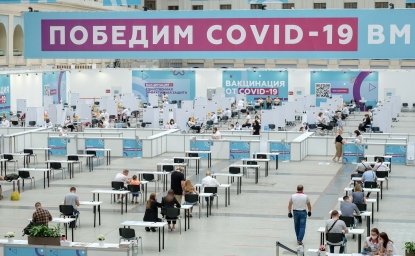
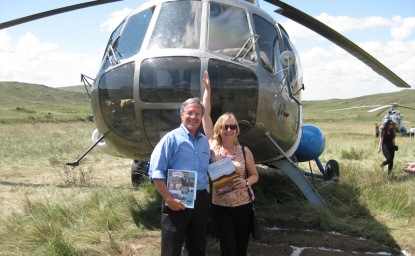
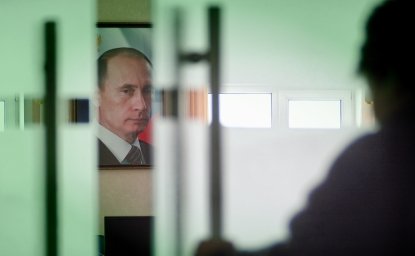
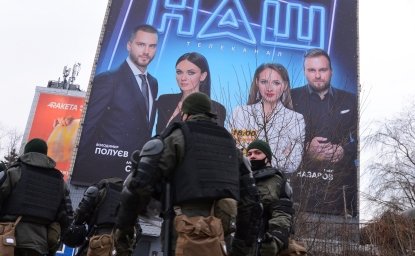
- Disinformation


